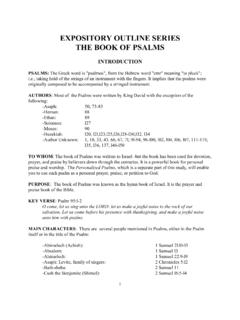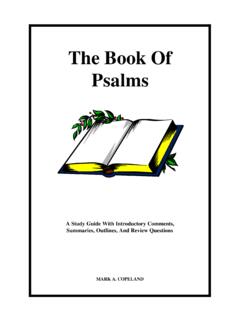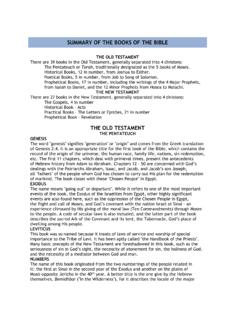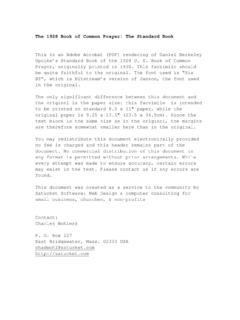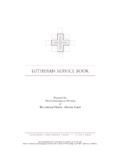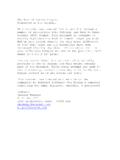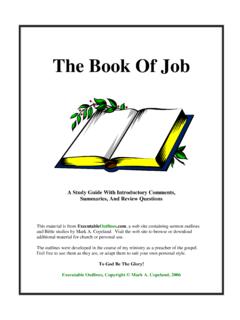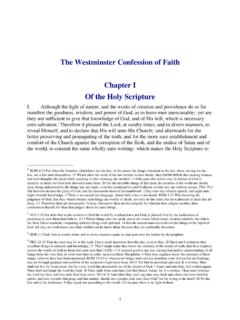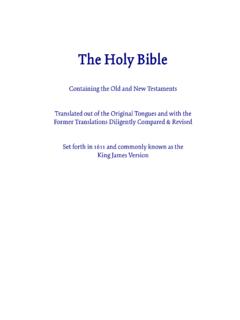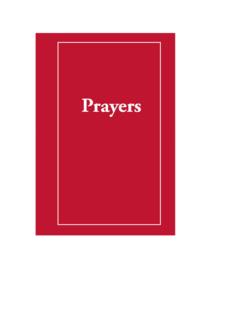Transcription of Psalms: The Coverdale Translation - SYNAXIS
1 1 Psalmsthe coverdaletranslation0-9yt=o65]p[edited byw. s. petersonand valerie macys This modern-spelling electronic version of Miles Cover-dale s Psalter was uploaded to my Web site Little Gidding: En-glish Spiritual Traditions1 in September 2000. It may of coursebe printed or downloaded and used for personal purposes, butI request that it not be posted on another site without my per-mission. William S. Peterson William S. PetersonMiles Coverdale , born in Yorkshire in 1487 or 1488, stud-ied at Cambridge University (where he became an Augstin-ian Friar) and was ordained priest at Norwich in about from these simple facts, little information survivesabout his early life, but we do know that he lived in excitingtimes, and inevitably this quiet, bookish young man, stimu-lated by Protestant ideas then in the air at Cambridge, wasdrawn into the great theological controversies of the after 1520 Coverdale attracted the attention ofThomas Cromwell, Earl of Essex, and soon began to enjoyCromwell s powerful friendship and patronage.
2 Neverthe-less, like many of his contemporaries, Coverdale who wasnow a convinced Lutheran but a mild-mannered, unagres-sive young man found the religious turmoil in England sodisturbing and dangerous that in 1528 he fled temporarily tothe Continent. There he travelled about, met some of theleading Protestant figures in Germany, and zealously studiedthe Scriptures. At about this time he wrote to Cromwell: Now I begin to taste of holy Scriptures; now, honour be toGod, I am set to the most sweet smell of holy letters, with thegodly savour of holy and ancient doctors, unto whose knowl-edge I cannot attain without diversity of books, as is not un-known to your most excellent wisdom. Nothing in the worldI desire but books as concerning my learning. They oncehad, I do not doubt but almighty God shall perform in mewhich he, of his most plentiful favour and grace, hath be-gun. There is abundant testimony by contemporaries ofCoverdale s unassuming nature (John Bale, for example, de-scribed him as a very gentle spirit ), yet the letter to Crom-well also reveals a quiet determination to master biblicalscholarship for some unspecified purpose.
3 What Coverdalehad in mind was nothing less than a full English translationof the Bible, which was duly published in 1535 with this title-page:BIBLIAThe Bible/ thatis, the holy Scripture of theOlde and New Testament, faith-fully and truly translated outof Douche and Latynin to was a bold undertaking for an obscure Englishman inexile with no conspicuous position in the Church and, exceptfor Cromwell, no allies at court. His book was, in fact, thefirst complete English Translation of the Bible (Tyndale s edi-tion of a few years earlier had not included most of the OldTestament), accompanied by a characteristically self-effac-ing prologue by Coverdale which began: Considering how3excellent knowledge and learning an interpreter of scriptureought to have in the tongues, and pondering also mine owninsufficiency therein, and how weak I am to perform the of-fice of a translator, I was the more loath to meddle with thiswork.. And to help me herein, I have had sundry transla-tions, not only in Latin, but also of the Dutch [ German]interpreters: whom (because of their singular gifts and spe-cial diligence in the Bible) I have been the more glad to fol-low for the most part, according as I was required.
4 The Translation was dedicated to Henry viii (who the pre-vious year had declared himself the head of the EnglishChurch), and Cromwell presented a copy to the King;though the book apparently received tacit royal approval, Coverdale s publisher, James Nicolson of Southwark, wasnot allowed to print a formal license on the title-page. In hisdedication Coverdale claimed that he had neither wrestednor altered so much as one word for the maintenance of anymanner of sects : his 1535 Bible, unlike many others issued inthe sixteenth century, was not disfigured by polemical notesor introductions, and Coverdale s Translation , which drewheavily on Tyndale s New Testament and Pentateuch, wastraditional, uncontroversial, and attractive from a widely felt need for a satisfactory vernacular Bible inEngland produced yet another version two years later, theso-called Matthew Bible, which attempted to combine thework of Tyndale and Coverdale .
5 This is turn led to the mostambitious English Translation of the century, the Great Bible(1539, with six further editions during 1540 41), commis-sioned by Cromwell and produced under the supervision ofCoverdale, a massive folio volume which was placed by royaldecree in every parish church. The Great Bible fell into dis-favor a few years later, and many copies were destroyed dur-ing the reign of Mary, though after the accession of Eliza-beth it was again reprinted in Great Bible is, in effect, an amalgam of the transla-tions of Tyndale and Coverdale , directly based upon theMatthew Bible but extensively revised by Coverdale . What iscurious about it is that Coverdale , modest as ever, is alwayseager to acknowledge the superiority of Tyndale s effortswhenever possible, and Coverdale s self-deprecating tonemay tempt us to underestimate the significance of his contri-butions to the book . The gifts that he brought to the taskwere considerable: a superb ear, an extraordinary sense ofEnglish prose rhythms, and a fluency which skillfullyblended disparate elements.
6 Before the publication of theAuthorized Version in 1611, the Great Bible was the most pol-ished and influential version of the Scriptures in our s later career was filled with danger and up-heaval. He was briefly Bishop of Exeter (1551 53) but was de-posed by Mary, imprisoned, and eventually allowed to leaveEngland again. Though he returned after Mary s death, henever again held a high position in the English Church, and4he died in comparative obscurity at the age of eighty-one achievements of Coverdale as a translator have beenlargely overshadowed by those of his predecessor Tyndale,who has always been much admired for the vigor and origi-nality of his style. To many modern readers, Coverdale sEnglish Bible may seem to possess a merely antiquarian in-terest, though its most attractive elements were in fact trans-muted into the greatest and most enduring of all Biblicaltranslations, the Authorized Version produced during thereign of James , almost by an accident of history, one very importantsection of Coverdale s Old Testament, the Hebrew Psalter(which owed nothing to Tyndale, who had died before hewas able to translate it), is still a living spiritual and literaryforce in our world today.
7 When the book of Common Prayerwas first introduced in 1549, the officially promulgated ver-sion of the Scriptures was the Great Bible; and the PrayerBook, following both Jewish and monastic precedents, con-tained the emphatic instruction that the Psalter shall beread through once every month as a normal part of Mattinsand Evensong. The Psalter, which thus by law was to be re-cited twelve times a year in every parish in the land, was notinitially printed within the covers of the new liturgical vol-ume (though publishers almost at once began to produceeditions of the Psalms in the same size and style as the PrayerBook). Yet when it was later incorporated in the 1662 revisionof the book of Common Prayer, it was Coverdale s Psalter whose stately rhythms were by now familiar to English con-gregations and choirs that was selected, even though allother biblical passages were revised to correspond to the Au-thorized was an accomplished linguist, with a good com-mand of Latin, Greek, and German, but he seems to havehad very little familiarity with Hebrew.
8 The textual sourceshe used in translating the Psalms are known (they include,among others, St. Jerome s fourth-century Vulgate andLuther s German Bible of 1524), and when Coverdale revisedfor the Great Bible, he made considerable use of SebastianM nster s Latin Translation (1534) of the Old Testamentfrom Hebrew. In the Authorized Version, by contrast, thePsalms were translated directly from Hebrew: despite thisdisadvantage in scholarly accuracy, the Coverdale Psalter re-mains unchallenged on purely literary grounds. Coverdale isnot necessarily the most reliable translator of his era; hisstrength lies rather in synthesizing, with unerring instinct, afluid, elegant text from the books in several languages thatlay before him as he wrote. As Professor S. L. Greenslade hasremarked, He knew well enough that that he could not excelas a pure scholar so that his choice between authorities wasfrequently not determined by erudition so much as by hissense of style.
9 Much more than Tyndale, Coverdale is a self-consciousartist, forever seeking those stately rhythms that harmonize5so well with Cranmer s magisterial prose in the book of Com-mon Prayer. Little wonder that musical settings of Cover-dale s Psalms began to appear as soon as his first Bible waspublished and that composers to this day are drawn to his su-perb words. There is no doubt that Coverdale s vocabularyand syntax occasionally sound archaic to us nowadays (butthen so do Shakespeare s), yet the presence of the Psalter inthe English Prayer book and of course in other AnglicanPrayer Books throughout the world has kept this brillianttranslation alive for more than four and a half this has changed within recent years. Now, as we enterthe third millenium of the Christian era, Coverdale s Psalterseems at last to be in danger of slipping into the museum ofcelebrated but forgotten historic texts. The Alternative Ser-vice book (1980) of the Church of England, which is rapidlysupplanting the 1662 Prayer book , offers worshippers, in its Liturgical Psalter, an awkward rewriting of Coverdale thathesitates weakly between old and new language.
10 The revisedAmerican book of Common Prayer (1977), while it supplies al-ternative versions of most services in order to placate thosewho might mourn the loss of Cranmer s felicitous style, nev-ertheless contains only one Psalter, which departs even moredramatically from the spirit of Coverdale . And this sort of li-turgical house-cleaning continues apace throughout the An-glican Communion. It does not require any special propheticgift to see that one of the most splendid translations in theEnglish language, which has given aesthetic pleasure andspiritual comfort to every generation since Coverdale s time,is likely to be pushed to the margins in the twenty-first think that ought to be a cause for regret. In the follow-ing pages we have presented to readers who can probablyno longer find it within the service books they hold in theirhands on Sunday morning Miles Coverdale s supremelybeautiful rendition of the most powerful collection of reli-gious verse from Jewish antiquity.
